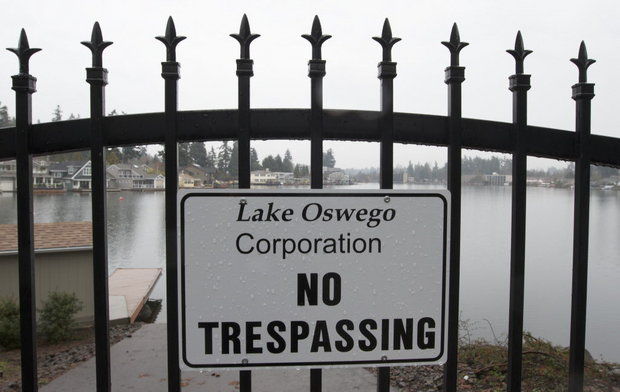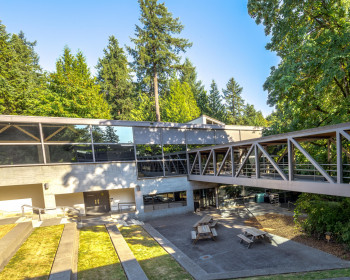Professor Michael Blumm – Access to Oswego Lake and the Public Trust Doctrine
Prof. Michael Blumm has been involved in an important case involving the public trust doctrine in Oregon regarding access to Oswego Lake (located in the community of Lake Oswego, down the road from the law school). The plaintiffs – assisted by Blumm - challenged a city ordinance that prohibits the public from entering the lake from three adjacent city parks, as well as a city policy limiting use of a city-owned swim park to city residents.
Open gallery

Prof. Michael Blumm has been involved in an important case involving the public trust doctrine in Oregon regarding access to Oswego Lake (located in the community of Lake Oswego, down the road from the law school). The plaintiffs – assisted by Blumm - challenged a city ordinance that prohibits the public from entering the lake from three adjacent city parks, as well as a city policy limiting use of a city-owned swim park to city residents. The Court of Appeals in Oregon recently issued an opinion in Kramer v. City of Lake Oswego, 285 Or App 181 (2017), essentially siding with the city and state’s claim that the public trust doctrine did not apply to the public parklands surrounding the lake. According to Blumm, “the court managed to avoid deciding whether Oswego Lake was navigable under state law, which it clearly is, since all that is required is a waterbody of sufficient size to float recreational watercraft, evident in abundance on any sunny day. Title navigability, which we think also applies because the lake was meandered at statehood, is not part of the case.”
Prof. Blumm is now drafting a law professors’ amicus brief in support of the plaintiffs’ petition for review in the Oregon Supreme Court. The amicus brief will argue that the case involves important issues of state law that may have national implications concerning navigability, the application of the public trust doctrine to parklands, the doctrine’s applicability to municipalities, and the distinction between private and public dedications of land. Blumm states that “perhaps the most worrisome aspect of the case is the state’s position that the public trust doctrine applies only to submerged lands owned by the state and the overlying waters. Submerged lands not owned by the state are, in the state’s view, subject to a so-called ‘public use doctrine,’ invented by the state AG about a dozen years ago, requiring no state action to vindicate public rights. Until this case, no court has ever upheld this state policy of inaction.” Blumm hopes that “the Oregon Supreme Court, which hasn’t handed down a public access trust case in 80 years, will decide to review the case and correct both the Court of Appeals and the state AG.”
The Oregon Court of Appeals decision is available here: Kramer v. City of Lake Oswego, 285 Or App 181 (2017)
Professor Michael Blumm is the Jeffrey Bain Faculty Scholar and Professor of Law at Lewis & Clark Law School. Professor Blumm is one of the architects of the Law School’s acclaimed Environmental, Natural Resources, and Energy Law Program. He has been teaching, writing, and practicing in the environmental and natural resources law field for more than thirty-five years. He came to the law school after practicing with an environmental group and the U.S. Environmental Protection Agency in Washington, D.C., where he helped draft the EPA’s first wetland protection regulations. Blumm’s chief interests are in the restoration of the Pacific Northwest salmon runs, the preservation of the West’s public lands and waters, the management of natural resources by Indian tribes, the modern use of the public trust doctrine, and governmental authority to regulate private property for public purposes.
Blumm is a prolific scholar, with well over one-hundred published articles, book chapters, and monographs on salmon, water, public lands, wetlands, environmental impact assessment, public trust law, and constitutional takings law, to name just a few topics. Much of his scholarship includes student co-authors. He also regularly helps students publish on their own. For example, over twenty of his students have authored state analyses in a comprehensive study of the public trust doctrine in the American states.
More Environmental, Natural Resources, & Energy Law Stories
Environmental, Natural Resources, and Energy Law is located in Wood Hall on the Law Campus.
MSC: 51
email elaw@lclark.edu
voice 503-768-6649
Environmental, Natural Resources, and Energy Law
Lewis & Clark Law School
10101 S. Terwilliger Boulevard MSC 51
Portland OR 97219

